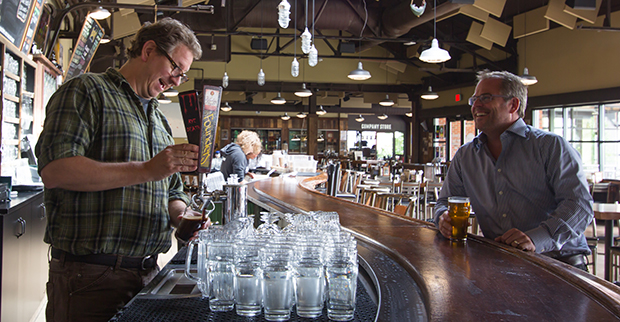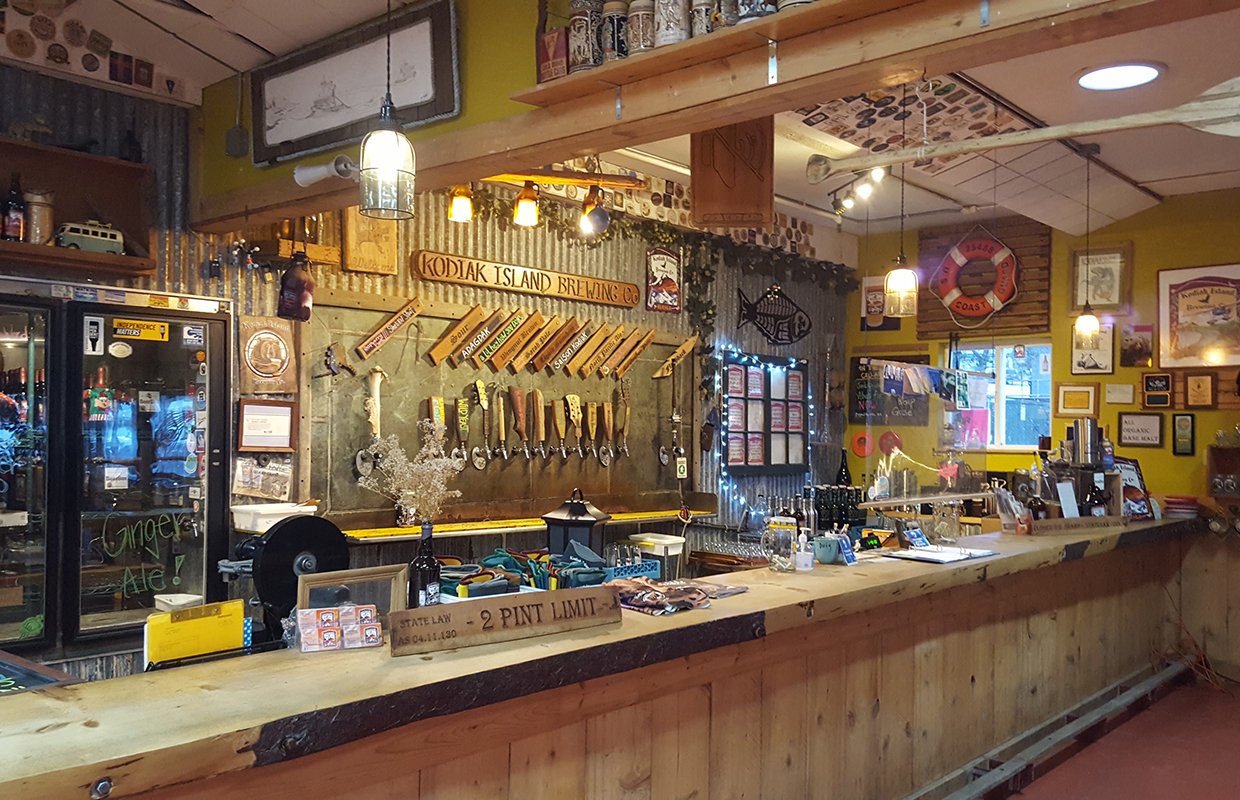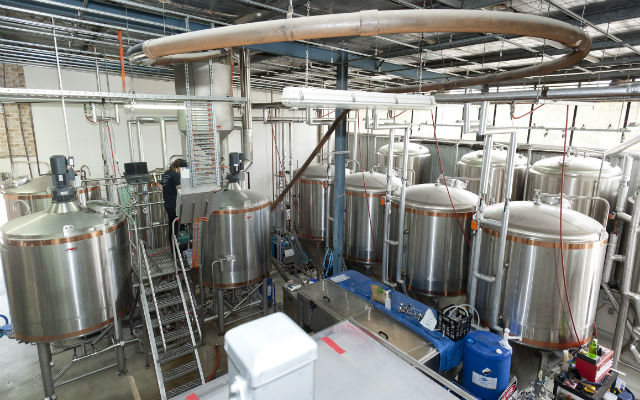
One option that continually plagues the human existence is its opportunity to quit. There are a million quotes that discuss how easy quitting is and how addictive it can become. When you quit once, it becomes easier and easier to do it again — to just stop what you’re doing and walk away.
Sure, when times get tough and business isn’t going your way, quitting comes to mind. You’re human, so it’s normal for quitting to be one of the your first ideas. But it’s what you do once that single defeated thought arrives that separates you from the pack.
If you think that thought never came to Mike Stevens and Dave Engbers, you’d be crazy. The two men that launched Founders Brewing in Grand Rapids, Michigan in 1997 weren’t successful right off the bat. Although their beers were being enjoyed at every beer festival they attended, they still weren’t financially successful. They struggled and felt the true difficulty in operating a business. But where they could have felt fear and quit, they kept their heads down, stayed focused and remained dedicated to becoming Founders.
Arriving at Founders Brewing Company in early May was unique. At the time parking was a hassle due to the $40 million expansion that’s been occurring. Streets were closed and it took a few turns to finally find the parking lot.
You can immediately feel the enjoyment people possess that work at a brewery. Even the construction workers on site were in a joyful mood and more than willing to provide directions to the front office. Walking in the doors of the front office of Founders Brewing, you already know you’re walking into a well-established office environment.
Above the Founders Brewing logo behind the front desk is the key phrase that’s echoed from the lips of Stevens and Engbers throughout the interview. The words that were chiseled as a mantra after years and years of struggle. These words, “brewed for us,” aren’t a marketing ploy to inspire employees or the long-time Founders consumers. Rather, they were three words used to help focus Stevens and Engbers on the future of the company, and how to achieve their goals.
“We didn’t really have a five year plan,” explained Engbers. “It was like, ‘let’s start this brewery’ and everything was by the seat of our pants.”
Neither of the partners had a business or finance background. But like many entrepreneurs, Stevens explained, it wasn’t so much a need for knowledge, but simply a desire to become owners of a business. “I think an entrepreneur is an entrepreneur and it maybe doesn’t necessarily require an MBA to do so,” said Stevens. “I think it’s more about the passion and the drive. We love brewing and that’s what got us interested in it, and from there you order your equipment and you figure it out. Now you’ve got hurdles to overcome and those hurdles come daily. Every day you learn something new, next thing you know you’ve got 10, 15 years under your belt, you turn around and you’re pretty damn good businessmen.”
In reality, it easily took 10 years for Stevens and Engbers to find their business acumen. Not to say they weren’t good at business early on, but it took nearly a decade to finally turn a profit and showcase the success of their drive and determination.
“I always say that when we started the brewery, the landscape wasn’t like it is today,” said Engbers. “Back then our goal was to be the second craft brewer in Michigan, behind Larry Bell.”
The frustration came with the delays in construction of the original Founders. In which case, they missed the opportunity to become the second craft brewery in Michigan as others opened and took that credit out from underneath the two owners.
“We really thought our window of opportunity is closing, if it’s not already closed,” explained Engbers. “It was a similar time to what we’re going through now where breweries are opening on a monthly, if not daily basis. I know the first couple of years everyone had a Pale Ale, an Amber Ale, some type of dark beer, some type of wheat with coriander — the biggest frustration for me was people kept saying, ‘it’s not as good as Bell’s,’ and having one of the best brewers an hour south of you, in retrospect was one of the best things that happened to us, because it made us raise the level of our game.”
All of a sudden Engbers and Stevens got systems in place to not only exist, but to compete in the Michigan brewing landscape. “I will say, when we started … certainly what drove us to start a brewery was the love of homebrewing and our hobby, but I think one of the biggest keys to success that we found with Founders is that we do have a business sense to it when most were just on the hobby side of it, in the craft side of it, which is the key to success,” added Stevens. “We definitely had a business approach to it that through time kept evolving and we got to this point where we realized if you’re smart about this, there’s a great advantage there.”
Although growth didn’t seem apparent for a while, what Stevens and Engbers were spending a lot of time doing was developing a structure that could sustain the business for a long period of time and help it to grow into the future. “We got to a point where somebody told us you have a really really expensive hobby,” said Engbers. “The business, … we were about breaking even. If you want to get to the next level you have to really up your game. That’s when we started bringing on a few more people … [and] you embrace people with a different skill set.”
“Over 20 years we lost money every single year from ‘97 to 2007,” said Stevens. “We lost money every year for the first 10 years, and we didn’t turn a profit until 2008. We started to build out a leadership team around 2010, so we were a good 14 years into it before we started bringing in a team. But when we did, it really helped us because we’re handling sales, business and marketing all on our own. Once you can spread that out it really starts to help.”
According to Stevens, once Founders Brewing started making a profit in 2008, it grew an estimated 100 percent. “As we always talk about, we’re an affordable luxury,” said Engbers. “But more than that, we had all this pent up demand for our product, but it was also the year that we opened up this facility and our tap room, which probably tripled in size from our original facility.
“During the recession people liked to hang out with friends and the tap room really exploded because people want to be with other people. It’s a fun place, there is a ton of energy down there.”
Another aspect that really changed Founders around 2008 was the passion, “brewed for us.” Stevens and Engbers collectively decided they wouldn’t focus on following so many trends anymore. They wanted to develop beer that they enjoyed drinking. It was their belief that this would assist in the growth of the company.
“The first couple of years we kind of struggled finding our sweet spot,” said Stevens. “We were trying to make the same beers everybody else was making and we realized after the first three years that wasn’t going to work. That’s when we were kind of flirting with bankruptcy and having to reinvent ourselves.
“We did that by really kind of creating these beers that were pushing the envelope, and really got involved in that whole extreme beer movement. We were on the front-end of that movement and that’s what really started to catapult our growth. That’s when it became fun for us too, that’s when we really decided to focus in on making beer we wanted to drink, and hopefully we find some consumers that are interested in what we’re doing.”
Even during this time Stevens said the company still had such a small base that even with the growth they were seeing from those beers, Founders was still losing money. “This was 2000, and it was 2008 until we were profitable as I pointed out,” said Stevens. “But we saw this brand and this culture growing that was exceptional and we started to create a buzz on a national level even though we were only [making] maybe 5,000 bbls. of beer. What happened ultimately is we couldn’t fit anymore tanks in our old brewery and we were stuck in the mud, so to speak.”
In these early stages Engbers recalled the company was paying cash for fermenters. He would go home at lunch, and due to his bad credit at the time, would have credit card opportunities waiting for him. He’d activate, go take the maximum cash withdrawal, and put the money on Stevens’ desk. “I’d say, ‘buy whatever we need,’” said Engbers. “There were times when we couldn’t bottle because we didn’t have glass.”
“We had three sources of cash that functioned as our line of credit,” explained Stevens. “Credit cards, the federal government, because we stopped paying our excise taxes for almost three years — I don’t recommend anyone going down that path — and basically our suppliers. Our suppliers would help. If we needed a fermenter, the folks we were buying fermenters from would let us pay them over 12 months.”
Founders Brewing was doing whatever it could just to make ends meet. They even sold the filter in order to make payroll, which was just the brewer, but he had to get paid. The sell of the filter ended up sticking with the company and causing the new location to brew non-filtered.
“People think we’re non-filtered because of some stroke of genius, but the reality is, we couldn’t pay our bills so we sold our filter and it forced us to figure out a process that allowed us still to produce clear beer,” said Stevens.
Now Founders Brewing can afford a filter, but it has become part of the brand. “It’s what makes our beer taste like it does,” explained Stevens.
The journey has been arduous for Stevens and Engbers. Although their beers became well-known relatively early on in their existence, Stevens said in regards to the early years, that success never felt quite real. “I don’t recall it being a feeling of instant euphoria, instant success, because every day was a battle to just get through it on a business side,” he said. “I lived in that world quite a bit and you went home in constant worry, because you knew someone was knocking on your door tomorrow.”
“I’d say I guess the one driving force that kept me motivated, able to persevere, was the fact that we knew that our product was great,” said Engbers. “We got to that point where you have these daily affirmations, whether it’s when your bar tending — going back 10-15 years, where the beer enthusiast community is driving in from Chicago, or people are coming up from all over saying, ‘I’ve heard about this beer, I had to come to Founders.’ The landscape was so different back then.”
While everything was good on the beer front, as it’s been repeated multiple times, business and growth weren’t always easy. However, it’s the difficulties that come with starting a business that help a lot of great entrepreneurs, Stevens and Engbers included, to become great down the road.
What they learned the most, according to Stevens was, “what this company represents, and that’s ‘brewed for us,’” he said. “That’s what came out of that lesson there. You know, I think the truly the great companies, whether it’s in this industry or not, are ones that focus on really something they want to do, something they enjoy that the founders are passionate about, and go after. You definitely don’t want to try and be everything to everybody, and it wasn’t really until we narrowed our focus on the products we wanted to brew that we became noticed — and, more importantly, we became happy, because that’s a big, big part of doing a tough job.”
The passion and the drive is what they learned most from the entire experience. “I remember in the first few years we had a handful of local investors that didn’t really understand the craft industry,” said Engbers. “One of our investors would say, ‘our son doesn’t like your beer,’ and we’d go, ‘we better change everything we’ve been doing.’ We were in our 20s and when you’ve got guys that have invested $20,000 to $50,000 you tend to listen to them. We’re a couple of young kids … you finally get pushed to the point where you go, ‘this is our business, you’re a businessman, this is our area of expertise.’”
They followed this strategy up to the point where they’ve just completed a $40 million expansion with a new brewhouse. “You know, the folks we bought our equipment from, Krones, just think we’re lunatics with our mash lauter ton and design,” said Stevens. “They’re like, ‘who the hell does this, a 300 bbl. mash lauter ton.’ You know at this point you separate that, but we’re like, ‘nope, this is how we do it.’”
Those are the things that Founders takes seriously. Sure they’ve performed tests that show they could be more efficient if they separated them, but Stevens said he knows there is flavor that comes out of the way they do it. “Everyone kicks out ales in 12 or 14 days,” said Stevens. “We average around 20, and it’s because we have to clarify beer because we don’t filter it. We have to spend more time in tank, but there is a meatier kind of heaviness to our flavor profiles that we get. There is something inherent about the flavor profiles about Founders beer that I haven’t found in the trade.”
It’s been this practice that has helped Founders Brewing to develop sub brands like the All Day IPA, Breakfast Stout and many others. It’s been Sevens’ and Engber’s passion towards developing beers that they’d like to drink, as opposed to following the brewing trends. All Day IPA is in fact the biggest showcase of the entire story: a beer that was founded by the founders of Founders from the desire to have a sessionable IPA before sessionable was trending, that would allow them to enjoy the hoppy flavors and aromas all day.
Stevens and Engbers have successfully delivered a company and a brand that is reflective of their passions and desires. While some may look at the All Day IPA and think it follows suit, in reality it’s just another piece to what makes the founders great. They know what they want, what they need and what they’re passionate about. All Day IPA wasn’t brewed to follow a trend, instead it was “brewed for us.”






As a fellow, though novice, beer writer. I loved the phrase ‘founded by the founders of Founders’. Good article. I felt like I got to know the founders.